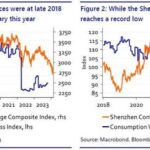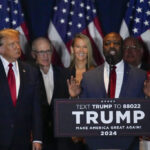
–>
April 28, 2023
Historically, the United States has acted overtly more often than not, with the Monroe Doctrine being a famous example — so why then is America’s strategy so often tied to ambiguity? Publicly shared doctrines of action and foreign policy are vital to ensure no misunderstanding!
Yet, what is going on with China?
Nature abhors a vacuum. For example, weather patterns result from equilibrium between high and low-pressure systems. Sadly, our world has entered perhaps its most dangerous time in history, with titanic battles between ideas and those seeking power, and an all but inevitable clash between the two remaining superpowers. What transpires over the next ten years will determine whether democracy and individual freedoms or tyranny and oppression prevail.
A weakened United States, reeling from failures of leadership in myriad social, economic, and geopolitical issues, faces off against an ascendant autocracy that has proven itself better able to focus its vision. In our favor, the most extraordinary collection of intelligence and innovation remains resident within our fellow citizens. Working against us are divisions encouraged by our enemies, plus a startling absence of leadership, leading to the decline of national will and vision.
There have always been those willing to compromise on core issues choosing to appease rather than stand for what’s right. Some believe they can engage tyrants — Neville Chamberlain with his “Peace in our Time” pronouncement comes to mind. Foolish American presidents have thought they could negotiate with enemies such as the Taliban or North Korea and tragically, that folly is frequently counted in American dead. Making the right call in foreign policy is something we’ve gotten wrong too often in the last 75 years. Why do we keep making the same mistakes?
Much of what I write is widely known and understood, and the fact that we frequently talk past each other also is understood. While a few crazies hold leadership positions within our government, many are intelligent, well-educated individuals.
There are issues that affect us all universally, notably, China. Bipartisanship is ideal, but you must agree on substance as well. We must find unity on at least four vital issues:
-
Taiwan. Americans are tired of wars they don’t support, and the proxy war in Ukraine is straining Americans’ interest. Should we go to war over Taiwan, we would see Americans dying on land and sea. Therefore, our weak president is challenged to explain why Taiwan is essential to our interest. A free Taiwan is a seminal moment for the U.S. as an economic interest and for our standing in the world. If Taiwan falls, the majority of advanced semiconductor capacity will fall into Chinese hands. Unfortunately, we are ten years from being independent in chips; if Taiwan falls, I predict we would enter an economic depression within 90 days as our civil and military industries grind to a crawl for lack of chips. Even worse, Australia, Japan, Viet Nam, the Philippines, and other nations are already choosing sides should Taiwan fall. This is the litmus test being carefully watched for a resolution. “Who cares?” you ask. Imagine a world where the United States cannot navigate the high seas unimpeded; the U.S. dollar is no longer accepted; we are blockaded from markets as other nations bow to their new boss, China. We will no longer be able to defend our freedom; this new boss wields its power ruthlessly and subjugates its enemies. Strategic minerals, trade, and rights of passage will be taken from any country that does not accept China’s preeminence.
-
Willingness to Engage. Everyone should understand that China is an autocracy where the rule of law is not a governing principle. This means that China can force the U.S. to react without being able to get ahead of its machinations. China’s closed system allows them a unilateral power to beat us up at will.
The U.S. has a card it has been historically unwilling to play, one on which China has come to rely: our ability to stop buying their products. China needs us (the Western world) much more than we need them. We’re addicted to cheap Chinese products so much that we don’t realize the actual cost — this is China’s Achilles Heel. Calling their bluff is a twofer for us. First, we start to bring home jobs. Second, we weaken an enemy who believes like Krushchev that the West would happily sell him the rope to hang itself with. -
Intellectual Property. IP may turn out to be how we lose this war. Corporations and many governmental officials love the idea of trade with China (as such trade provides access to a vast market), and their business acumen is to grow at any cost. The folly shown here reveals that China has begun to reduce its volume of deals with the West. China has now appropriated the technology it lacked previously, and trade is not nearly as rich and lucrative as it was twenty years ago. Now technology transfer defines the trade relationship; we see blatant theft through espionage, third-party transfers, unscrupulous companies, and people willing to make a deal with the devil for a buck. But there’s more. Remember Huawei? At the core of China’s strategy is the ability to have “perfect intelligence.” Perfect intelligence means knowing what your adversary knows at the same time they do. Huawei is a Chinese company that sells the backbone components of computer networks. U.S. and foreign intelligence believe China has left a backdoor in their hardware to allow them to access data networks. In addition, Huawei is controlled by the CCP, which frequently gives away its technology to countries or finances it at rock-bottom prices to ensure its network equipment is used. Only in the last few years has this danger been uncovered, and the U.S. government and most U.S. and European corporations have banned Huawei equipment.
-
War by other means. China has made no bones about its intent to dominate its own hemisphere as it prepares for war with the West. But perhaps President Xi sees an easier way: let your enemy defeat itself. Over 150 Americans die daily from fentanyl, almost a half million in all so far. Fentanyl is a weapon used against our country, and China is the primary producer of the chemicals required to make the drug, which they freely ship to us. All while executing their citizens who use drugs. Isn’t this a war by other means?
America’s place in the world is wobbly at the moment. We do not have a clear sense of self, a strategic or tactical plan for stabilizing our country, or a determination to win at all costs. This demonstrates our fundamental failure of leadership.
Real diversity entails diversity of thought, with the American people coalescing around their own value systems, State by State. They must then fight to uphold those ideals, as no federal laws, policies, or pronouncements have any hope of bringing us together. Individually, we are just too different, but as Americans, we are united.
God Bless America!
Allan J. Feifer—Patriot, Author, Businessman, and Thinker. Read more about Allan, his background, and his ideas to create a better tomorrow at www.1plus1equals2.com.
‘); googletag.cmd.push(function () { googletag.display(‘div-gpt-ad-1609268089992-0’); }); }
Image: Free image, Pixabay license, no attribution required.
<!– if(page_width_onload <= 479) { document.write("
“); googletag.cmd.push(function() { googletag.display(‘div-gpt-ad-1345489840937-4’); }); } –> If you experience technical problems, please write to [email protected]
FOLLOW US ON
<!–
–>
<!– _qoptions={ qacct:”p-9bKF-NgTuSFM6″ }; ![]() –> <!—-> <!– var addthis_share = { email_template: “new_template” } –>
–> <!—-> <!– var addthis_share = { email_template: “new_template” } –>






